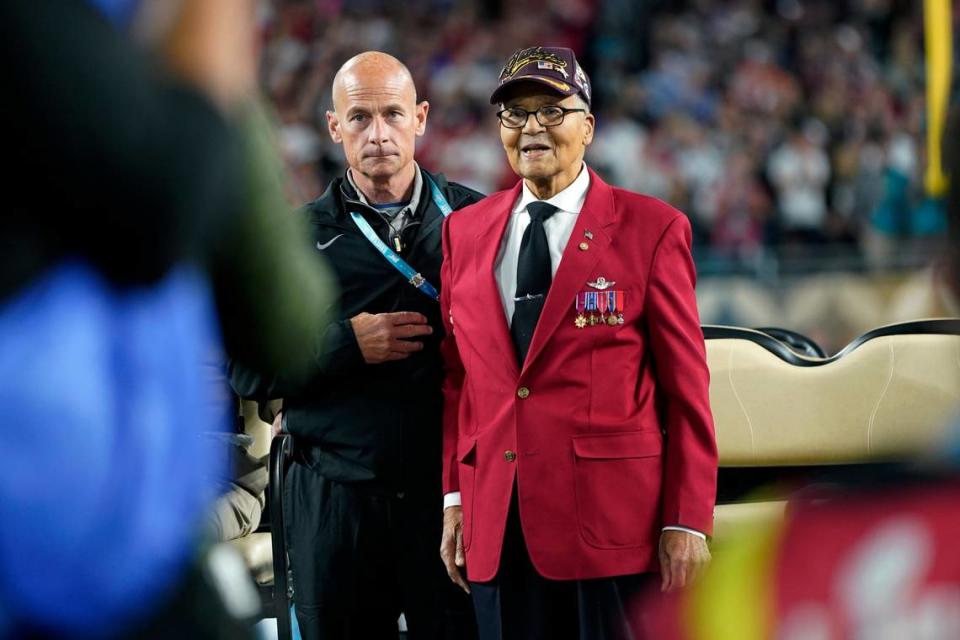Charles McGee, Tuskegee Airman who ran Kansas City’s downtown airport, dies at 102
- Oops!Something went wrong.Please try again later.
Brig. Gen. Charles E. McGee, one of the last surviving Tuskegee Airmen who flew 409 combat missions and later managed Kansas City’s downtown airport, died Sunday. He was 102.
Following 30 years of active duty, McGee made Kansas City home after he retired from the Air Force in 1973. By then, he had flown “more combat missions in World War II, Korea and Vietnam than any other Air Force pilot,” according to the National World War II Museum.
“Today, we lost an American hero,” Defense Secretary Lloyd J. Austin III wrote on Twitter. “While I am saddened by his loss, I’m also incredibly grateful for his sacrifice, his legacy, and his character.”
Last year, McGee stood alongside Kansas City Mayor Quinton Lucas, members of the Heart of America chapter of the Tuskegee Airmen and other officials as the Charles B. Wheeler Downtown Airport’s general aviation terminal was renamed after McGee. Lucas called McGee a “wonderful leader” for Kansas City and the U.S., and said as a child, he watched all of what McGee accomplished.
“It is rare that we get to stand in front of heroes, particularly multiple heroes,” Lucas said at the ceremony, later adding: “In a time where ... there’s so much challenge in our country, I think about someone like you, Gen. McGee, and I think about how you can truly bring so many together ... with a commitment to service, with a dedication to our community and our country.”

As of last year, U.S. officials said McGee was one of only nine surviving Tuskegee Airmen.
After news of McGee’s death Sunday, condolences poured in from across the country. NASA called McGee a “trailblazer.” Vice President Kamala Harris recalled how she thanked McGee for his service just last month, on his 102nd birthday. In a Facebook post, Kansas City’s downtown airport described McGee as “genuine and humble.”
“One of the last surviving Tuskegee Airmen, his dedication to our nation has been an inspiration across generations,” Air Force Secretary Frank Kendall said in a statement.
McGee died in his sleep, according to Reuters. “He had his right hand over his heart and was smiling serenely,” one of his daughters, Yvonne McGee, said in a statement, the news organizations reported.
He was born Dec. 7, 1919, in Cleveland, Ohio, according to his National World War II Museum biography. He later studied engineering at the University of Illinois but then enlisted in the Army Air Forces in 1942.
McGee was among more than 900 men to train in rural Alabama from 1940 to 1946 after the Army Air Corps was forced to admit Black pilots. About 450 deployed overseas and 150 lost their lives in training or combat. McGee was one of only a few pilots — white or Black — who flew combat missions in World War II and during the Korean and Vietnam wars.
“You could say that one of the things we were fighting for was equality. Equality of opportunity,” he told The Associated Press in a 1995 interview. “We knew we had the same skills, or better.”
In the 1950s, McGee was stationed at Kansas City’s Richards-Gebaur Air Force Base. More than 20 years later, he became the base’s first Black commander.
In 1978, McGee went back to school and earned a business degree from Columbia College in Columbia, Missouri.
Then from 1980 to 1982, he worked as the manager of the then-Kansas City Downtown Airport. He later served on the city aviation department’s Aviation Advisory Council. As of last year, he lived in Maryland.
When a film focused on the Tuskegee Airmen came out in 1994, McGee told The Star that historians had not included them in history books. He said their wartime record grew only more admirable when put in context.
“You have to realize what existed socially then — both the segregation in society and the fact that the Army Air Corps mirrored society,” McGee said, adding that the Black airmen “persevered to not only show they could meet the standards of the Army but do well — to not only be able to fly but also be in combat.”
Among McGee’s dozens of awards was the nation’s highest for civilians: the Congressional Gold Medal, which he received in 2007 along with all of the Tuskegee Airmen.

After he turned 100, McGee was accorded an honorary commission promoting him to the one-star rank of brigadier general under a congressional measure signed by President Donald Trump. In 2020, McGee won applause from members of Congress when introduced by Trump during his State of the Union address.
The Associated Press contributed to this report.

